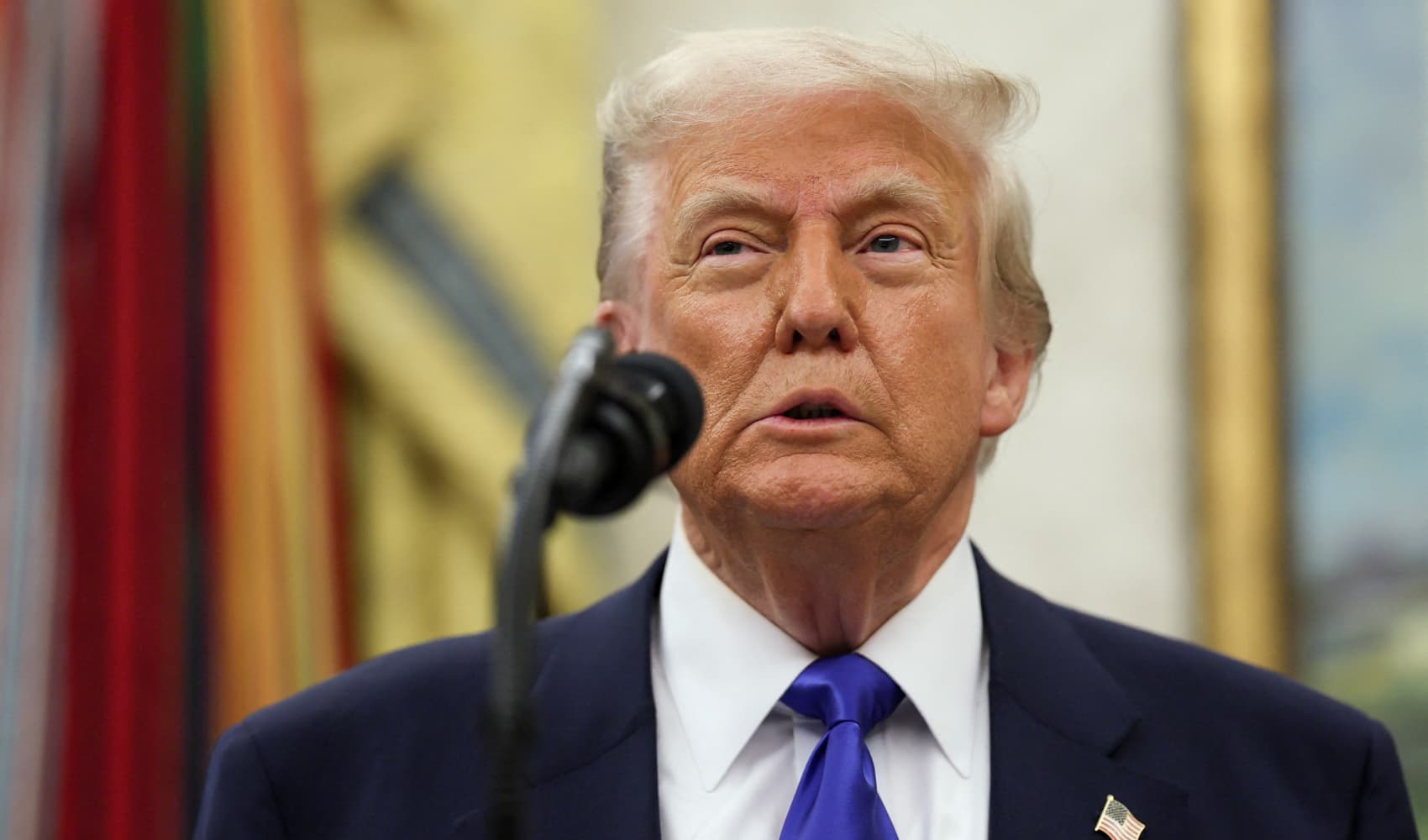Rate Cut Debate: Trump vs. Powell Fuels Market Uncertainty
Trump vs. Powell: Will a Rate Cut Ignite the Market or Fuel a Fire?
The Clash of Titans: Trump's "Jet Fuel" Vision vs. Powell's Prudence
President Donald Trump and Federal Reserve Chairman Jerome Powell are at it again, and this time, the stakes feel even higher. Trump is practically begging for a rate cut, painting a vivid picture of the markets soaring like a rocket fueled by "jet fuel." But Powell, ever the cautious central banker, seems hesitant to light the fuse. So, what's really going on? Let's dive deep into this high-stakes economic drama.
Trump's Rate Cut Plea: A "Crazy Reason" for Delay?
Trump didn't mince words. He accused Powell of being unwilling to lower interest rates, even suggesting a rather...unconventional motive. He told reporters that Powell "doesn't want to do it," possibly because "he's not in love with me." Is this just political posturing, or is there a deeper truth to Trump's frustration? One thing is certain: the pressure is on.
The China and UK Factor
Trump pointed to China and the UK, among other nations, as examples of countries that *have* lowered interest rates. His argument is clear: if they can do it, why can't we? Is he simply playing copycat, or does he genuinely believe a rate cut is the key to sustained economic growth?
Powell's Perspective: Playing it Safe in Uncertain Times
Why the resistance from Powell? Well, central bankers are generally a cautious bunch. They like to see clear signs of economic distress before pulling the trigger on a rate cut. And right now, the picture is...well, let's just say it's complicated.
The Tariff Uncertainty Cloud
One major factor hanging over everything is the ongoing trade war, and the tariffs, of course. The Federal Reserve has clearly stated that "economic uncertainty created by tariffs" is a key reason why they haven't lowered rates. So, is Powell simply waiting for the dust to settle?
What is a Federal Funds Rate?
Let's take a step back. What exactly is the federal funds rate? Simply put, it's the target rate that the Federal Reserve wants banks to charge one another for the overnight lending of reserves. When the Fed lowers this rate, it becomes cheaper for banks to borrow money. Which in turn, leads to cheaper loans for consumers and businesses.
The "Jet Fuel" Analogy: What Does Trump Really Mean?
Trump's "jet fuel" analogy is a powerful one. He believes that a rate cut would inject a surge of energy into the markets, sending stocks soaring and boosting economic activity. Think of it like this: lower interest rates make borrowing cheaper, which encourages businesses to invest and consumers to spend. That extra spending, theoretically, translates into economic growth.
The Potential Downsides: Is Trump Ignoring the Risks?
But there's always a flip side, isn't there? What are the potential dangers of a rate cut? Some economists worry that overly low interest rates can lead to excessive risk-taking, asset bubbles, and ultimately, financial instability. Are we heading for a new dot-com bubble?
Inflation Fears
Another concern is inflation. If you flood the market with too much money, prices could start to rise rapidly. Is Trump willing to risk inflation to get the short-term boost he desires?
Global Interest Rate Trends: Following the Crowd or Leading the Way?
Trump is right; other countries are cutting interest rates. But is that a reason for the U.S. to follow suit? Each country's economic situation is unique. Just because it works for China or the UK doesn't necessarily mean it will work for the U.S. Should we blindly follow, or blaze our own path?
Political Pressure vs. Economic Independence: A Delicate Balance
The Fed is supposed to be independent from political influence. But let's be honest, the pressure from the White House is real. How can Powell maintain the Fed's independence while also addressing the President's concerns? It's a tightrope walk, to say the least.
The Market's Reaction: Nervous Anticipation
The markets are watching this drama unfold with bated breath. Every tweet, every speech, every Fed announcement sends ripples through Wall Street. Are investors bracing for a rate cut, or are they preparing for continued caution from Powell?
The Impact on Consumers: Lower Rates, More Spending?
For the average American, a rate cut could mean lower interest rates on mortgages, credit cards, and other loans. This could free up more money for spending, potentially boosting the economy. Should we be happy about a rate cut?
The Future of the Fed: Will Powell Bend?
So, what's next? Will Powell eventually give in to Trump's pressure and cut rates? Or will he stand his ground and maintain his cautious approach? Only time will tell. But one thing is certain: this is a battle that will shape the future of the U.S. economy.
Expert Opinions: Divided on the Right Path
Economists are divided on whether a rate cut is the right move. Some argue that it's necessary to stimulate growth, while others warn of the potential risks. There is no consensus; it boils down to individual perspective and economic forecasting models.
Conclusion: A High-Stakes Gamble with Uncertain Outcomes
The Trump-Powell showdown over interest rates is more than just a political squabble. It's a high-stakes gamble with potentially significant consequences for the U.S. economy. Trump believes a rate cut is "jet fuel" for the markets, while Powell seems hesitant to take the risk. The markets are watching, consumers are waiting, and the future of the economy hangs in the balance. Key takeaways: Trump wants a rate cut to stimulate the economy, Powell is hesitant due to tariff uncertainty, and economists are divided on the best course of action.
Frequently Asked Questions
What exactly is the Federal Reserve?
The Federal Reserve, often referred to as the Fed, is the central bank of the United States. It's responsible for managing the nation's money supply, setting interest rates, and regulating the banking system.
Why is the Fed independent from the government?
The Fed's independence is designed to protect it from short-term political pressures. This allows it to make decisions based on long-term economic goals, rather than political expediency.
How does a rate cut affect the stock market?
Generally, a rate cut is seen as positive for the stock market because it makes borrowing cheaper for companies, which can lead to increased investment and profits. However, it can also signal concerns about the economy, which can have the opposite effect.
What are the risks of keeping interest rates too low for too long?
Prolonged low interest rates can lead to asset bubbles, excessive risk-taking, and inflation. It can also make it more difficult for the Fed to respond to future economic downturns.
How do tariffs affect the Federal Reserve's decisions?
Tariffs create uncertainty about future economic growth and inflation. This makes it more difficult for the Fed to predict the impact of its policies and can lead to hesitancy in making significant changes to interest rates.

